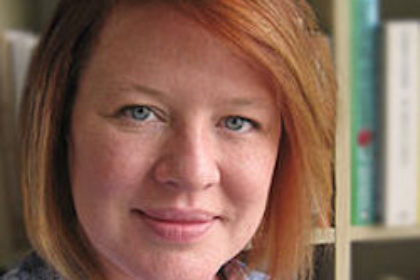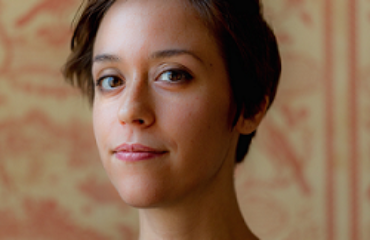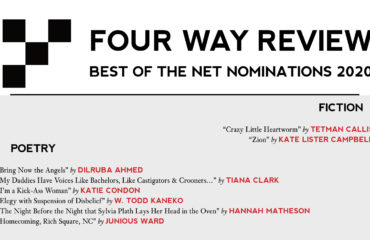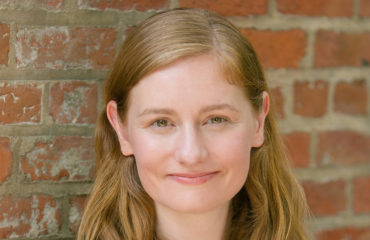
In the office, coworkers Sabine and Michael sat quietly at their cubicles. In the office, there was flux. For example, sometimes the temperature waffled between tropical and arctic, and the managerial staff also ran hot and cold. Sabine sat with Michael on her right and Melissa, who had been hired before her and always wore earbuds, on her left. Their collective boss, Heidi, was going through a divorce and sometimes had outbursts, and at these times Sabine and Michael turned toward their keyboards and screens. Melissa either did not hear or pretended not to.
Sabine had lied to get the job. She didn’t know anything about making slide presentations or spreadsheets.
“How are your pivot tables?” Heidi had asked in the interview.
“Well, I think they usually turn out beautifully,” Sabine had replied. Her response seemed to go over well, though she didn’t really know what a pivot table was. It had to do with spreadsheets, she knew that, but why or how? No clue.
It didn’t matter to her, lying. She’d lied to get her last job, at a coffee shop. It was just a job. In that interview, she had said, I prefer medium-body roasts with a strong finish, when in fact she had no idea what she preferred. None of it was life or death. It was not like she was pretending to be a doctor.
The coffee shop had taken her through college, roughly—she didn’t actually graduate—and she had enjoyed working there. She liked learning how to properly grind the beans and then tamp the grounds. She enjoyed negotiating the old, fussy espresso maker, and she enjoyed pulling the shots into warm mugs. She did not enjoy steaming milk because she believed her coffee was good enough not to need milk, but she still steamed with aplomb, until the foam coated the back of a spoon. Occasionally, if she was hungry, she could admit that milk-steaming be damned, she did enjoy a very dry cappuccino. Yet, usually she was not hungry.
After she dropped out and the semester turned and the coffee shop teemed with new freshmen, with their textbooks and their hope, bonking against the regulars at their usual tables, she understood she couldn’t stay because she wasn’t either of them. She was their barista, not their peer.
On a break one day, Sabine used the community computer to begin contriving a résumé, inventing nearly all of it. Besides the freshmen, she had two other groups of clientele: the consultants and the writers, and she drew her inspiration from them—from the consultants, a bullet-pointed skillset; from the writers, a sense of hope that if she could just get it down, the next line (always the next line) might be perfect enough to nudge her whole life forward.
Besides, it seemed like all the two groups ever did was type, and she could touch type. It was the writers she admired more. Some had a few published pieces, and all had books in various stages. She liked their dreaminess, the way they made it up as they went along, even if most of them tipped poorly.
And it was the writers who, when the city entertained zoning a chain coffee shop only a few blocks down, hosted a rally and showed up with pithy signs, and it seemed to work. The chain did not appear in the neighborhood. Maybe, even, Sabine’s job was saved.
The coffee shop had responded by opening up for more readings. Instead of just the Tuesday open mic that had been a standard since well before Sabine’s time, every other weeknight and alternating Fridays gave space to the writers, and so she heard the way they fabricated, and she heard the way they frequently could not separate these fabrications from their own lives.
She understood them a little more as she worked on the résumé, as the project stretched from just one break to two, to three, to a whole month of breaks. Sometimes she thought she was judging them a little harshly. At other times she thought if they would spend less time drinking coffee and smoking cigarettes, they’d get more writing done.
At their readings, their abundant, repetitive readings, the short-shorts and prose poems would echo from the cheap, poorly adjusted microphone and ping against the espresso machine, so that no matter how carefully they had constructed their sentences and stanzas, it all sounded like clatter. Sometimes she recognized the stories from her customers’ lives, like the time Penelope (photo essays) and Raul (short-stories with an emphasis on temporalization) had ended their eight-year affair at the corner table, the best table, there by the window and overlooking the bay (slideshow by Penelope, captions by Raul). There was the time Jane (nonfiction) and her teenage daughter Chrysanthemum (free verse, contemporary haiku, and hybrid poetry) thought they had been evicted, but it turned out to be okay; it was only that they were both stoned and were at unit 401 instead of 501, and they didn’t understand right away, as their world filtered through a slow pot swirl, that the notice tacked to the door was not for them, because it was not their door, not their furniture inside when they jiggled the handle to get in so they could quickly round up what they could carry. The mauve sofa in 401 jolted them to realization—(verse and live gong by Chrysa, reading by Jane):
What a difference
Just one flight up those old stairs
Makes for us, Mother
She thought of them as she used one of the built-in templates from the word processing software. She had started by putting her name and address at the top, but sometimes she retyped it; in fact she had retyped it probably a hundred times, just so she could feel the action of her fingertips on the keyboard, feel like she was working.
Of course she had noticed the writers always changed what happened, trying for pith or drama. The consultants probably did too. She didn’t know what they did at their jobs, but she saw the spreadsheets, the charts, and she had taken enough statistics, worked her butt off for a B- even, to understand that there was as much interpretation in data as in trouble and love.
Almost evicted.
(Cool blue light under the door
My home. Mother’s home.)
And Penelope’s Polaroid photos, grainy and off-color because she bought old, unpredictable film to save money and then coated the prints in Mod Podge to seal them up and scanned batches at the library, paired with Raul’s minimalist narration, actually worked well, Sabine thought, but it was nothing like them as a couple. As a couple they did not have the gritty tension of mixed media. As a couple they were boring, and each had complicated coffee orders, and they argued about whether it was okay for Penelope to say she was vegetarian when she was actually pescatarian.
“Fish are animals too, Penelope,” Raul would say.
“But no one knows what it means,” Penelope would answer.
“I know what it means,” Raul said.
“But you’re vegan. Of course you know. Most people consider eating only fish to be vegetarian.”
In her time at the coffee shop, Sabine heard a hundred variations on this argument, and a hundred times she had assured Raul that she never put his almond milk into the dairy steamer, even though she did it all the time.
“Catholics maybe think this, the Lent thing,” Raul would say to P, “but don’t put your religious industrial complex in this space. Fish have eyeballs. Broccoli does not have eyeballs!”
And one series on their slides, during their reading/presentation, did address this. A corn with human ears. Eyes on potatoes, on beans. A radicchio styled to look like a vagina. P’s vagina. Kiwi fruit as Raul’s balls, avocado as another man’s larger balls.
By the time the readings started, the consultants were always gone. They finished work at two or three, snapping their laptop cases shut, packing up their messenger bags, and padding out into the street in their colored tennis shoes, headed to their condos for a night of Netflix or other Wi-Fi-enabled activities.
On the community computer, Sabine listed her college, and she listed her imaginary skillset.
Later, she would ask Raul to proofread it and P to offer some suggestions for design flair (lines at the side, Sabine’s name in cerulean blue). Chrysa changed her objective so it read:
Making coffee now
But looking for my big break
Call, not pull, the shots?
It took her longer to ask one of the more regular consultants to take a look, and while she didn’t know a thing about him but his coffee order (doppio) she believed that he would offer her the ruthless critique she needed.
“Too many words, too much color,” he said, while looking at his phone. “Sentences aren’t helpful. Just use bullets and tabs. Everything must have a result,” he said. “And listen, what’s your number? I’ll text you a list of words you have to work in.”
“I have a pen,” Sabine said.
“I’d rather text,” he said.
She recited her number, and he sent the text, and she stared at it for a while. Velocity. Synergy. Demonstrable. Actionable.
“Okay,” she said. “Thank you.”
At the community computer, she deleted Chrysa’s objective, P’s blue lines, and Raul’s semicolons. She did so a little guiltily, ignoring the advice of all the people she liked best.
Demonstrable experience in enabling synergy with actionable approach to departmental velocity.
“Good,” the consultant said.
“I don’t even know what that means.”
“That’s fine. Meaning isn’t really the point. It’s not art, it’s just a résumé. I’ll text you a couple of places I know are hiring.”
She submitted. Then she waited. Then she started getting calls.
At the first interview, she did very poorly. She was dressed wrong, and her hair looked messy.
For the second interview, Sabine blow-dried. Her head felt bouncy, and when paired with the gray twinset she’d found at a secondhand store, she thought she could pass for the type of person who held a desk job. Her boyfriend, who she shared the apartment with, said she looked like her mother.
“What’s your greatest weakness?” the second interviewer asked.
Sabine correctly recognized this as a place where she should tell a lie. “My greatest weakness is that I am sometimes too truthful,” she said.
“Can you relate that characteristic to this role?”
“No,” Sabine said. “I cannot.”
“Okay,” the interviewer said. “Well, that’s truthful, but not really what I’m looking for.”
On the third interview, with Heidi (nervous, distracted Heidi), Sabine wore the twinset, blow-dried, and texted the consultant. What do I do if I don’t know the answer to a question? Dodge, he replied.
“How are your pivot tables?” Heidi asked.
“Well, I think they usually turn out beautifully,” Sabine replied.
When she got the offer, she was shocked at the salary, at the number of vacation days. Health and dental and vision. She ran her tongue across her teeth and imagined how much smoother they would be with two annual cleanings. She squinted—she didn’t need glasses, but she could get some anyway.
Her boyfriend was not impressed.
Her boyfriend’s name was Ryan, but he preferred to go by Sebastian.
Sabine didn’t care what he went by, since she’d spent her whole life having the pronounced e of her name dropped.
He was still piddling at school, in a studio program. The program was actually competitive, but Sabine honestly could not pick out his installation art from any of his peers’. At the shows, there was string, a lot of string, and there were nails and scraps of denim; there was salt everywhere, salt making gallery floors slick and prematurely aging the finishes. Tempura paint. Oil paint. Paint from organic vegetable dyes. Once, just after the offer, her boyfriend needed a pint of blood, but he was scared of needles so he made it from boiled beets.
“It’s too purple,” Sabine said, peering into their only large pot, roiling on the stove. Now and then a hunk of tuber would pop to the surface. “Maybe add turmeric? The yellow might balance it out?”
“Purple and yellow make gray,” he said, and she could tell he was trying to keep his voice calm. “You’re selling out.”
“I’m not,” Sabine said. “I just can’t do the coffee thing anymore.”
“You used to make the most beautiful bird-scapes,” he said. He was wistful as he stirred the pot of desiccated beets. He threw in a handful of beet tops, a neutralizing green.
It was hard for her to describe to him why she’d quit the bird-scapes—her word, which she did not point out he was appropriating, for the canvasses she outlined nature scenes on and then filled in with feather. When she’d first started, in high school, the project had seemed very pure and she had spent hours collecting fallen feathers, but as time went on, it was easier to purchase in craft shops or on eBay. After one spin through the washer at the Laundromat, crammed into an old pillowcase and washed on hot, her bagged, store-bought feathers were ragged enough to pass for having been found on the forest floor.
And at first she’d only used pine tar or other kinds of pitch and sap to affix the feathers to her hand-stretched canvas boards she’d cut herself with a manual saw, but as time went on, she wielded a hot glue gun against whatever hangable surface she could find on sale. There just wasn’t time to do it all—work and school and scavenging. At the very beginning of her junior year, she’d landed a solo show, but the only piece that had sold was the worst of all of them—synthetic down pasted to a bed of rayon and glitter in a cheap attempt at Starry Night. She priced it at $2,345.67. The ascending numbers, simply a random way to price, were meant to be a marker to anyone who actually cared about art, because she was embarrassed of the piece, but the enormous eighteen-by-twenty-foot canvas filled the space for the other works she didn’t have. She was even more humiliated that someone wanted to buy it, and absolutely deflated when she cashed the check, even though it got her current on rent.
Still, her boyfriend had been impressed by her take, and he delighted in its irony.
Now that she had spent more time at a proper office, and more time with her coworker Michael, she thought about it differently. Consecutive pricing, she could have called it, the string of ascending numbers. It could even be a way to bid. Start with five, and go from there. $5.43; $54.31; $543.10.
Her boyfriend didn’t know Michael, but that didn’t stop him from not liking him.
He would never say his name, only “that guy.” That guy you sit with, that guy you work with, that guy—wait, why are you having lunch with that guy?
At the office, she and Michael didn’t talk about art so much, though Sabine thought about it as she worked through her slides, through her tables. At first, she knew so little, she was constantly at the help files, and she wished Raul and Penelope and Jane and Chrysa had a nicely tabled instruction set detailing exactly how to proceed.
She’d heard Penelope and Raul had patched things up, and Chrysa was doing a series of observations:
Oh, it’s so stable—
You at your screen. What about
The rest of your life?!
Sometimes she looked up and Michael would be looking at her, and then he would look away, though Sabine would not. Once, after a long weekend, the elevator opened to the twelfth floor and Michael was just outside the door. He’d been in early, was headed out for coffee.
And there was a pull there, in the way he looked at her, the way he touched her shoulder.
“Oh, hi.”
“Hi.”
“Coffee?” he asked.
“I’m fine,” she said, but she was not fine. The spot on her shoulder was burning. This was what Ryan/Sebastian had seen before she’d seen, the way she wanted to pull Michael to her. She wished she’d worn something different than her same rumpled twinset and black pants.
Then they were exchanging places, she stepping outside of the elevator and he stepping in, and then the doors were closing and he was whooshing through the building, past the debt collectors on floor ten, the engineers on six.
She imagined him descending, swiftly, away from her. She depressed the button on the elevator, to call the next car, but the elevator was taking forever, and she didn’t know where, exactly, he might get coffee from; there were many places and among many other things she didn’t know about Michael, she didn’t know which shop was his favorite.
Sabine turned from the elevator bank and headed for the stairs. At eleven, she passed Melissa, earbuds snug, slim thighs hiking the flights. At seven, a group of workers arguing. By the time she burst through the lobby and into the street of her downtown building, Michael was long gone. A light rain had started, and she spotted Heidi, sheltered by a polka-dot umbrella, crossing the street. Even though at home Sabine and Sebastian/Ryan talked a lot about feelings, she didn’t think she could explain this feeling to him, how all she’d really have to do was wait for Michael to come back, his latte steaming, but also how it seemed impossible to wait. How she liked Heidi but didn’t want to talk to her in this moment. How the way the steam rising from the manhole covers and the cars splattered with just a few sparse drops seemed inexplicably and terminally sad.
How, when she looked at the sidewalk, the concrete dark with dirt and damp, there was a single feather, and how, whether fallen from the sky or loosed from a scavenging pigeon’s wing, as much as she wanted it, Sabine simply could not bend, could not pick it up.


